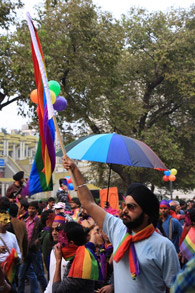India's Supreme Court has asked groups challenging a 2009 landmark judgement by the Delhi High Court that decriminalised gay sex how "unnatural sex" should be defined.
The ruling overturned a 148-year-old colonial law which described a same-sex relationship as an "unnatural offence". Under Section 377 of the colonial Indian Penal Code which defines homosexual acts as "carnal intercourse against the order of nature", homosexual acts were punishable by a 10-year prison term.
The ruling at the time however did not include the repeal of the 148-year-old law although it declared that the interpretation of Section 377 IPC to criminalise homosexual behaviour done in private among consenting adults violates fundamental rights like the right to protection of life and personal liberty, to equality and the right to prohibition of discrimination on grounds of religion, race, caste, sex or place of birth.
The provision, however, continues to apply in the case of sex involving minors and nonconsensual sex.
Various political, social and religious groups have since submitted 16 appeals to have the law reinstated.
The issue now before Supreme Court also centers on whether the ruling by the Delhi High Court which currently only applies to the capital territory can be extended throughout the country.
The Hindustan Times (Feb 16, 2012):
Justices G S Singhvi and S J Mukhopadhyay on Wednesday sought to know from those opposed to legalising homosexuality as to what could be the meaning of the term "order of nature" in Section 377 of the Indian Penal Code (IPC) in the age of test tube babies and surrogacy.
"Who is the expert to define the term 'order of nature', more so in relation to carnal intercourse? Meaning of words has never been constant. Test-tube babies, surrogate mothers - are they in the order of nature?" said a bench of justice GS Singhvi and justice SJ Mukopadhya.
- What is ‘order of nature’ in age of test tube babies: SC
The Indian Express (Feb 17, 2012):
Homosexuality may be “abnormal”, but it is not unnatural, the Supreme Court said today, and challenged anti-gay groups to point out even a single piece of penal law in India under which homosexuality in particular is a punishable offence.
“Homosexuality may be abnormal for some, unnatural for some others. All abnormal sex is not unnatural. There is a difference between unnatural, natural and abnormal... And in each case it has to be proved that an individual act was against the order of nature,” the court said, questioning the very logic behind the government generalising homosexuality as an unnatural offence under Section 377 of the Indian Penal Code (IPC).
– No law says homosexuality is unnatural... society has changed: SC
The Times of India (Feb 17, 2012):
The Supreme Court on Thursday questioned the basis on which homosexual acts could be considered "against the order of nature" as defined under section 377 of the penal code.
Noting that homosexuality became an offence with the enactment of the Indian Penal Code in 1860, a bench comprising Justice G. S. Singhvi and Justice S. J. Mukhopadhaya pointed out that it was not an offence before that.
"How do you say that this is unnatural?.. It was not an offence in 1859 or 1857," Justice Mukhopadhaya said.
– Homosexuality was not a crime before 1860, says Supreme Court
The Indian Express (Feb 16, 2012):
“So who is the expert to say what is ‘unnatural sex’? The meaning of the word has never been constant,” a Bench of Justices G S Singhvi and S J Mukhopadhyaya said.
“We have travelled a distance of 60 years. Now it is test tube babies, surrogate mothers. They are called discoveries. Is it in the order of nature? Is there carnal intercourse?” the Bench asked
To this, advocate Amarendra Saran, who represents Delhi Commission for Protection of Child Rights, said the “order of nature does not change with time”. The Union Home Ministry, government bodies and private groups are among those fighting the July 2009 judgment in the SC.
– SC: Who is the expert to say what’s ‘unnatural sex’
To read a detailed account of the court proceedings by gay rights activist Vikram Doctor, click here.

